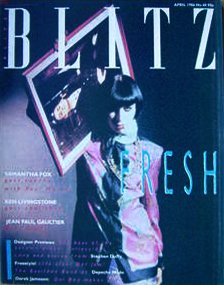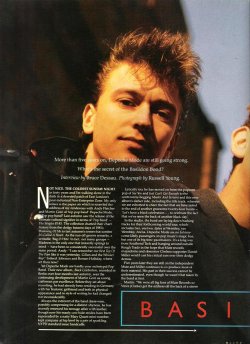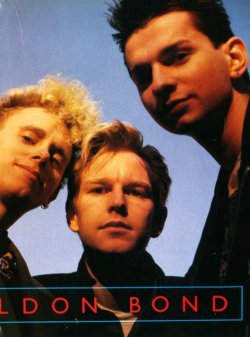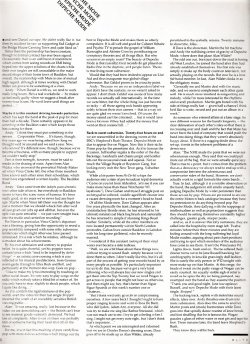Basildon Bond
[Blitz, April 1986. Words: Bruce Dessau. Picture: Russell Young.]
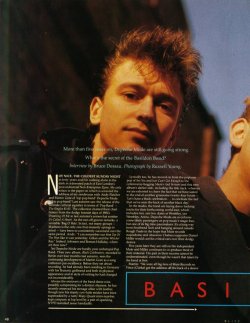
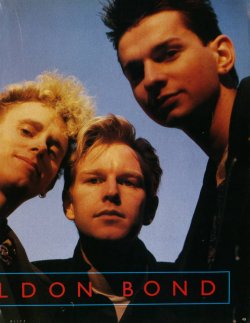
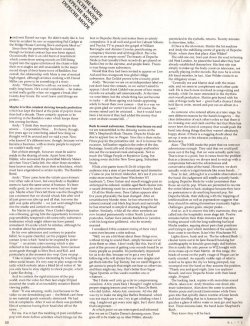
More than five years on, Depeche Mode are still going strong. What’s the secret of the Basildon Bond? Interview by Bruce Dessau. Photograph by Russell Young.
Not nice. The coldest Sunday night in forty years and I’m walking alone in the dark in a deserted patch of East London’s post-industrial Non-Enterprise Zone. My only solace is the paper on which is scrawled the address of my rendezvous with Andy Fletcher and Martin Gore of ‘top pop band’ Depeche Mode.
Top pop band? Last autumn saw the release of the ultimate cultural signifier in terms of ‘Pop Band’ – The Singles 81-85. The collection charted their chart history from the dodgy futurist days of 1981’s Dreaming Of Me to last autumn’s somewhat somber It’s Called A Heart. As the run-off groove remarks, a veritable ‘Bag O’ Hits’. In fact, not many groups – Madness is the only one that instantly springs to mind – have been so consistently successful over the same period. Andy: “I can remember our first Top Of The Pops like it was yesterday. Gillan and The Whicker Rap.” Indeed. Joboxers and Roman Holliday, where art thou now?
Yet Depeche Mode are hardly your archetypal Pop Band. Their new album, Black Celebration, recorded in Berlin over four months last autumn, sees the continuing development of Martin Gore as a song craftsman par excellence. Before they set about recording, he had already been residing in Germany with his Teutonic girlfriend and both in physical appearance and in style of writing he had changed not inconsiderably.
Always the extrovert of the band dress-wise, possibly compensating for a distinct shyness, he has recently renewed his teenage affair with leather, though now his manly cow-hide strides have been superseded by a natty Mary Quant mini-number, kept company at hip level by a pair of sparkling NYPD standard issue handcuffs.
Lyrically too, he has moved on from the popcorn pop of See You and Just Can’t Get Enough [1] to the controversy-begging Master And Servant and this new album’s darker side, including the title track, wherein we are exhorted to cheer the fact that we have lasted to the end of another gruesome twenty-four hours – ‘Let’s have a black celebration… to celebrate the fact that we’ve seen the back of another black day.’
In the studio, the band are laying down backing tracks for their forthcoming world tour, which includes two, yes two, dates at Wembley, yes Wembley, Arena. Depeche Mode are no Johnny-come-lately passengers on pop music’s magic bus, but one of its big time pacemakers. It’s a long way from Southend Tech and hanging around outside Rough Trade in the hope that Mute Records majordomo and obsessive Chelsea supporter Daniel Miller would cast his critical ears over their dodgy demos.
Five years later they are still on the independent Mute and Miller continues to co-produce most of their material. His part in their success cannot be underestimated [sic], even though he wasn’t that taken by the band at first.
Martin: “We were all big fans of Mute Records so Vince (Clarke) got the address off the back of a sleeve and sent Daniel our tape. He didn’t really like it, but then by accident he saw us supporting Fad Gadget at the Bridge House Canning Town and quite liked us.”
Since then the partnership has been constant, though no formal contract has ever been signed. Occasionally there is an odd burst of resentment which comes from seeing records on EMI being hyped into the upper echelons of the charts while their own singles are still unavailable in the major record shops of their home town of Basildon [2], but overall, the relationship with Mute is one of mutual high regard, although at times working with Daniel Miller can prove to be something of a strain.
Andy: “When Daniel is with us, we tend to work really long hours. He’s a real workaholic – he makes us feel really guilty when we suggest a break after twenty-four hours. He won’t leave until things are perfect…”
Maybe it is this constant striving towards perfection which has kept the band at the peak of pop for more than half a decade. There certainly appears to be something in the Basildon water which keeps those hits coming for them.
Andy: “I think they must put something in the sewers… Corporation Wine… It’s funny, though, five years ago we were being asked how long we thought we’d be around and we said a year. Now, who knows? It’s different now, though, because we’ve become a business, with so many people to support we couldn’t really stop.”
Part of their strength, however, must be said to reside in the sharing of roots. Apart from Alan Wilder, who answered the proverbial Melody Maker ad when Vince Clarke left, the other three members have known each other since their schooldays, which must have engendered a certain loyalty. The Basildon Bond.
Andy: “Dave came from the (adopts quasi-dramatic tone) other side of town, but everybody in Basildon seems to have the same sense of humour. It’s been really good, in six years we’ve never had any bust-ups. Maybe when Vince left there was the thought for just a moment that we should all whack him after we’d just given our jobs up and all that, but even the split was quite amicable, we just went straight back into the studio and carried on recording.”
For Martin in particular, Vince Clarke’s departure was a blessing, giving him the opportunity to reveal a pop sensibility tempered with some nifty subversive tendencies which might otherwise have passed unrealized. It’s a role which he relishes, although he is modest about his achievements.
By his own admission and yet contrary to popular belief, he is quite cheerful, yet his poppier tunes contain lyrics which “tend to be inspired by darker things” – an artistic criss-crossing which is also reflected in his musical predilections, from German avant-garde through to fifties Rock and Roll, and particularly at the moment doo wop. Gore on pop…
“I like to make my lyrics interesting by touching on taboo social issues. It’s very easy to play songs on the radio which nobody takes a blind bit of notice of. Yet you only have to stray slightly to shock people, which I quite like doing…”
As if to confirm the rigid structures of the pop world, even the video for their last single Stripped incurred the wrath of an incredibly sensitive British viewing public…
Alan: “It was amazing, really. Just because in the video we are demolishing cars – the British can’t bear to see material goods wantonly destroyed. We had lots of complaints. After it was on there was probably a film of someone having their head shot off on the news…”
For me, it is in fact this meshing of pure candyfloss pop with more dubious activities which brings out the best in Depeche Mode and makes them so utterly compulsive. It is all well and good for Cabaret Voltaire and Psychic TV to preach the gospel of William Burroughs and Aleister Crowley pontificating on conspiracy theories and all things illicit. But why scream in an empty room? The beauty of Depeche Mode is that (usually) their records do get played on Radio One in the daytime, and people listen. Theirs is true living-room subversion.
Would that they had been invited to appear on Live Aid and this inaugurate true global village subversion. But Geldof proves to be a touchy point.
Andy: “Because we are on an independent label we just don’t have the contacts, so we weren’t asked to appear. I don’t think Geldof was aware of how many records we actually sell internationally. At the time we were bitter, but the whole thing has just become so tacky – all those ageing rock bands appearing solely to boost their own career – that in a way we are quite glad we weren’t involved. Of course the money raised can’t be criticized… but it would have been a lot more if they had added the money that went on their cocaine bill…” [3]
Back to sweet subversion. Twenty-four hours on and we are reassembled in the dressing rooms at the BBC’s Shepherd’s Bush Theatre. Depeche Mode are due to appear live on Wogan. Now, this is their niche. Prime pop for the primetime slot. As if to honour the occasion, full leather regalia is the order of the day. Backstage, handcuffs and chains jangle and leather lets out the occasional creak and squeak. Not so much the Village People or Boystown Gang, but looking every inch the New Town gang. Suburban studs.
While a bit-parter from Hi-De-Hi whips up the audience into a state of pre-broadcast tepid dementia (“Come on you lot from Aldershot, let’s see if you can make more noise than these Winchester W1 layabouts”), Dave Gahan and myself struggle past an archetypal be-rollered, middle-aged Beeb cleaner into a vacant dressing room for a moment’s head to head.
[Blitz, April 1986. Words: Bruce Dessau. Picture: Russell Young.]
Impressively well thought-through article with plenty of comment from each band member. The article examines the band's staying power by moving carefully into darker and more pensive territory while keeping a pop sensibility, all set against a sublime-to-the-ridiculous backdrop of three minutes of miming on a TV show. With articles like this it's a wonder that it took another four years for Depeche Mode to attain all-round critical acclaim.
" It is all well and good for Cabaret Voltaire and Psychic TV to preach the gospel of William Burroughs and Aleister Crowley pontificating on conspiracy theories and all things illicit. But why scream in an empty room? The beauty of Depeche Mode is that (usually) their records do get played on Radio One in the daytime, and people listen. Theirs is true living-room subversion. "



More than five years on, Depeche Mode are still going strong. What’s the secret of the Basildon Bond? Interview by Bruce Dessau. Photograph by Russell Young.
Not nice. The coldest Sunday night in forty years and I’m walking alone in the dark in a deserted patch of East London’s post-industrial Non-Enterprise Zone. My only solace is the paper on which is scrawled the address of my rendezvous with Andy Fletcher and Martin Gore of ‘top pop band’ Depeche Mode.
Top pop band? Last autumn saw the release of the ultimate cultural signifier in terms of ‘Pop Band’ – The Singles 81-85. The collection charted their chart history from the dodgy futurist days of 1981’s Dreaming Of Me to last autumn’s somewhat somber It’s Called A Heart. As the run-off groove remarks, a veritable ‘Bag O’ Hits’. In fact, not many groups – Madness is the only one that instantly springs to mind – have been so consistently successful over the same period. Andy: “I can remember our first Top Of The Pops like it was yesterday. Gillan and The Whicker Rap.” Indeed. Joboxers and Roman Holliday, where art thou now?
Yet Depeche Mode are hardly your archetypal Pop Band. Their new album, Black Celebration, recorded in Berlin over four months last autumn, sees the continuing development of Martin Gore as a song craftsman par excellence. Before they set about recording, he had already been residing in Germany with his Teutonic girlfriend and both in physical appearance and in style of writing he had changed not inconsiderably.
Always the extrovert of the band dress-wise, possibly compensating for a distinct shyness, he has recently renewed his teenage affair with leather, though now his manly cow-hide strides have been superseded by a natty Mary Quant mini-number, kept company at hip level by a pair of sparkling NYPD standard issue handcuffs.
Lyrically too, he has moved on from the popcorn pop of See You and Just Can’t Get Enough [1] to the controversy-begging Master And Servant and this new album’s darker side, including the title track, wherein we are exhorted to cheer the fact that we have lasted to the end of another gruesome twenty-four hours – ‘Let’s have a black celebration… to celebrate the fact that we’ve seen the back of another black day.’
In the studio, the band are laying down backing tracks for their forthcoming world tour, which includes two, yes two, dates at Wembley, yes Wembley, Arena. Depeche Mode are no Johnny-come-lately passengers on pop music’s magic bus, but one of its big time pacemakers. It’s a long way from Southend Tech and hanging around outside Rough Trade in the hope that Mute Records majordomo and obsessive Chelsea supporter Daniel Miller would cast his critical ears over their dodgy demos.
Five years later they are still on the independent Mute and Miller continues to co-produce most of their material. His part in their success cannot be underestimated [sic], even though he wasn’t that taken by the band at first.
Martin: “We were all big fans of Mute Records so Vince (Clarke) got the address off the back of a sleeve and sent Daniel our tape. He didn’t really like it, but then by accident he saw us supporting Fad Gadget at the Bridge House Canning Town and quite liked us.”
Since then the partnership has been constant, though no formal contract has ever been signed. Occasionally there is an odd burst of resentment which comes from seeing records on EMI being hyped into the upper echelons of the charts while their own singles are still unavailable in the major record shops of their home town of Basildon [2], but overall, the relationship with Mute is one of mutual high regard, although at times working with Daniel Miller can prove to be something of a strain.
Andy: “When Daniel is with us, we tend to work really long hours. He’s a real workaholic – he makes us feel really guilty when we suggest a break after twenty-four hours. He won’t leave until things are perfect…”
Maybe it is this constant striving towards perfection which has kept the band at the peak of pop for more than half a decade. There certainly appears to be something in the Basildon water which keeps those hits coming for them.
Andy: “I think they must put something in the sewers… Corporation Wine… It’s funny, though, five years ago we were being asked how long we thought we’d be around and we said a year. Now, who knows? It’s different now, though, because we’ve become a business, with so many people to support we couldn’t really stop.”
Part of their strength, however, must be said to reside in the sharing of roots. Apart from Alan Wilder, who answered the proverbial Melody Maker ad when Vince Clarke left, the other three members have known each other since their schooldays, which must have engendered a certain loyalty. The Basildon Bond.
Andy: “Dave came from the (adopts quasi-dramatic tone) other side of town, but everybody in Basildon seems to have the same sense of humour. It’s been really good, in six years we’ve never had any bust-ups. Maybe when Vince left there was the thought for just a moment that we should all whack him after we’d just given our jobs up and all that, but even the split was quite amicable, we just went straight back into the studio and carried on recording.”
For Martin in particular, Vince Clarke’s departure was a blessing, giving him the opportunity to reveal a pop sensibility tempered with some nifty subversive tendencies which might otherwise have passed unrealized. It’s a role which he relishes, although he is modest about his achievements.
By his own admission and yet contrary to popular belief, he is quite cheerful, yet his poppier tunes contain lyrics which “tend to be inspired by darker things” – an artistic criss-crossing which is also reflected in his musical predilections, from German avant-garde through to fifties Rock and Roll, and particularly at the moment doo wop. Gore on pop…
“I like to make my lyrics interesting by touching on taboo social issues. It’s very easy to play songs on the radio which nobody takes a blind bit of notice of. Yet you only have to stray slightly to shock people, which I quite like doing…”
As if to confirm the rigid structures of the pop world, even the video for their last single Stripped incurred the wrath of an incredibly sensitive British viewing public…
Alan: “It was amazing, really. Just because in the video we are demolishing cars – the British can’t bear to see material goods wantonly destroyed. We had lots of complaints. After it was on there was probably a film of someone having their head shot off on the news…”
For me, it is in fact this meshing of pure candyfloss pop with more dubious activities which brings out the best in Depeche Mode and makes them so utterly compulsive. It is all well and good for Cabaret Voltaire and Psychic TV to preach the gospel of William Burroughs and Aleister Crowley pontificating on conspiracy theories and all things illicit. But why scream in an empty room? The beauty of Depeche Mode is that (usually) their records do get played on Radio One in the daytime, and people listen. Theirs is true living-room subversion.
Would that they had been invited to appear on Live Aid and this inaugurate true global village subversion. But Geldof proves to be a touchy point.
Andy: “Because we are on an independent label we just don’t have the contacts, so we weren’t asked to appear. I don’t think Geldof was aware of how many records we actually sell internationally. At the time we were bitter, but the whole thing has just become so tacky – all those ageing rock bands appearing solely to boost their own career – that in a way we are quite glad we weren’t involved. Of course the money raised can’t be criticized… but it would have been a lot more if they had added the money that went on their cocaine bill…” [3]
Back to sweet subversion. Twenty-four hours on and we are reassembled in the dressing rooms at the BBC’s Shepherd’s Bush Theatre. Depeche Mode are due to appear live on Wogan. Now, this is their niche. Prime pop for the primetime slot. As if to honour the occasion, full leather regalia is the order of the day. Backstage, handcuffs and chains jangle and leather lets out the occasional creak and squeak. Not so much the Village People or Boystown Gang, but looking every inch the New Town gang. Suburban studs.
While a bit-parter from Hi-De-Hi whips up the audience into a state of pre-broadcast tepid dementia (“Come on you lot from Aldershot, let’s see if you can make more noise than these Winchester W1 layabouts”), Dave Gahan and myself struggle past an archetypal be-rollered, middle-aged Beeb cleaner into a vacant dressing room for a moment’s head to head.

